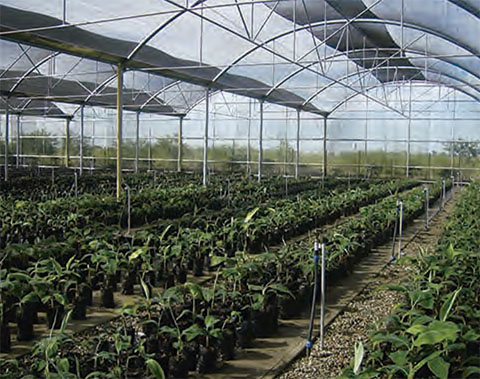Mass production of quality banana seedlings through in vivo propagation method
Abstract
Banana cultivation is considered worldwide as the most important item among musaceae; used as food for human consumption, due to its high nutritional contribution mainly in carbohydrates and minerals as part of the diet of our population; in Venezuela it is distributed in all states, from small conuco-type crops to large plantations. The state of Barinas is one of the main banana producers in the country, constituting an immense potential for its economic development.
That is why the National Institute of Agricultural Research (INIA) in the state of Barinas, has been working on the introduction of technological improvements for the production of quality seed, which allows producers to increase their yields and thus contribute to the agri-food security of the nation. In the Experimental Field Codazzi of the INIA Barinas, some works have been carried out on the technique of in vivo propagation of banana seed, because, for sowing, producers use seeds that they acquire through purchase, barter or exchanges with other producers, without taking into consideration the phytosanitary and selection criteria, which carries great consequences due to the presence of pests and diseases, which can directly affect the productive development of the plantation. This technique is an alternative for the propagation and massification of plantain seedlings of phytosanitary quality.
Banana cultivation is considered worldwide as the most important item among musaceae; used as food for human consumption, due to its high nutritional contribution mainly in carbohydrates and minerals as part of the diet of our population; in Venezuela it is distributed in all states, from small conuco-type crops to large plantations. The state of Barinas is one of the main banana producers in the country, constituting an immense potential for its economic development.
That is why the National Institute of Agricultural Research (INIA) in the state of Barinas, has been working on the introduction of technological improvements for the production of quality seed, which allows producers to increase their yields and thus contribute to the agri-food security of the nation. In the Experimental Field Codazzi of the INIA Barinas, some works have been carried out on the technique of in vivo propagation of banana seed, because, for sowing, producers use seeds that they acquire through purchase, barter or exchanges with other producers, without taking into consideration the phytosanitary and selection criteria, which carries great consequences due to the presence of pests and diseases, which can directly affect the productive development of the plantation. This technique is an alternative for the propagation and massification of plantain seedlings of phytosanitary quality.
References
Delgado E., E. Martínez, M. Navas, O. Contreras y J. Hernández. 2013. Producción Masiva por Propagación in vivo de Semilla de Calidad de Plátano en Barinas, Venezuela. II Congreso Latinoamericano y del Caribe de Plátanos y Bananos. Instituto Nacional de Investigaciones Agrícolas en Barinas (INIA-Barinas).
Palencia G., R. Gómez y J. Martín. 2006. Manejo Sostenible del Cultivo de Plátano, Corporación Colombiana de Investigaciones Agropecuarias, Editorial Produmedios, Bogota Colombia.


